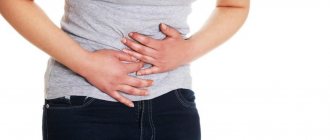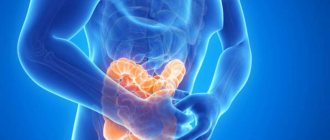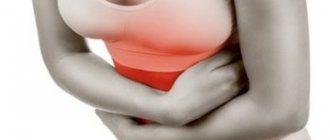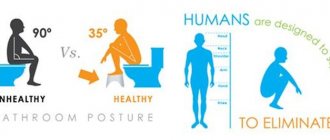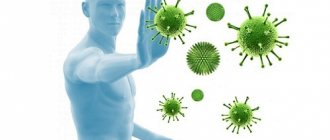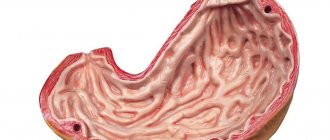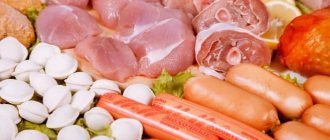The appearance of pain indicates the development of a pathological process in organs and tissues. In most cases, the stronger the pain, the more pronounced changes occur. However, it also happens that the disease is asymptomatic and manifests itself only when irreversible changes have occurred.
Acute abdominal pain cannot be ignored, as it is fraught with serious complications that can lead not only to lifelong maintenance drug therapy, but also to death. Even if your stomach hurts periodically and the intervals between attacks are long, you still need to contact a gastroenterologist and undergo an examination.
Acute pain in the stomach
This symptom very rarely occurs by accident. Most often, it becomes a reflection of pathogenic processes occurring in the body, which cause severe spasms in the upper parts of the digestive system.
If they occur, it is urgent to establish the main causes of such a condition, take the first measures to alleviate the patient’s well-being, and immediately contact a specialist for routine or emergency care. You cannot delay calling a doctor, because sometimes gastralgia accompanies very dangerous diseases and conditions that threaten the health or even the life of the patient.
Sometimes it acts as an independent sign, but more often it is included in a certain clinical picture, allowing a specialist to make an accurate diagnosis.
Many people are confused when they have severe stomach pain and do not know what to do. It is impossible to try to independently identify the disease, much less self-medicate if gastralgia occurs. The pathologies that accompany it quickly gain intensity and can lead to serious complications.
Nature and location of pain
In many ways, making a diagnosis for a specialist can make it easier to understand the characteristics of the sensations experienced by the patient.
- A burning sensation in the upper part of the abdominal cavity reflects an exacerbation of gastritis, stomach ulcers, solarium.
- Intense, persistent pain, also spreading to the lower sections, may indicate the occurrence of colitis or cholecystitis.
- Stitching sensations or spasms in the epigastrium occur with gastric ulcers or duodenitis.
- An aching feeling near the upper abdomen indicates gastritis with high acidity or a stomach ulcer.
- A bursting sensation near the epigastrium indicates gastritis with low acidity or narrowing of the pylorus.
- A pain near the upper part of the abdominal cavity accompanies a recurrence of an ulcer or pancreatitis. Then it often has a point character or spreads along the left and even back side of the body.
- Severe sudden paroxysmal gastric pain, the so-called “dagger”, often signals a perforation of the stomach walls.
It is also very important for the doctor to establish the time of onset of the symptom. In various pathologies, it is observed during fasting, at night, after eating, in a sitting or lying position.
Liver and gallbladder problems
Pain in the upper right stomach that comes and goes may signal problems with the gallbladder, such as gallstones.
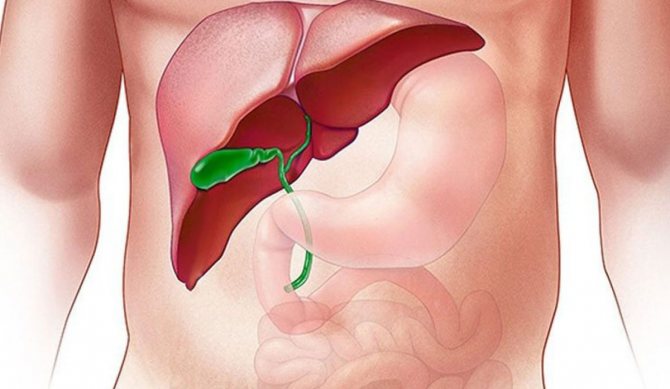
Gallstones can block the gallbladder ducts, making digestion difficult. This causes pain soon after eating, especially after very fatty foods. People with gallstones may notice that the pain begins a few hours after eating, lasts 4-6 hours, and then goes away.
Gallstones sometimes go away on their own. Untreated gallstones can also cause problems with the pancreas. If a person experiences vomiting, pale stools, or fever along with symptoms of gallstones, they should seek emergency medical attention.
Otherwise, consult your doctor for a diagnosis and treatment plan. Home treatment is not effective for gallstones.
Common causes of acute stomach pain
An attack of gastralgia most often occurs due to a variety of reasons. Each of the negative factors causes certain symptoms and can be determined depending on the nature and location of the discomfort.
Most often, stomach pain occurs due to an addiction to spicy or fatty foods, spices and sauces, as well as due to long-term use of certain medications.
Often, gastralgia can occur as a result of severe nervous tension, excessive drinking, long-term smoking or excessive physical effort.
Most often, the doctor suspects poisoning, exacerbation of a stomach ulcer or gastritis.
Other factors that provoke acute pain may include:
- gastroenteritis;
- congestion in the upper abdomen;
- Helicobacter pylori infection;
- parainfluenza;
- various dysfunctions of the gastrointestinal tract;
- toxic infection, etc.
Infection with bacterial or viral microflora usually causes diarrhea, severe nausea, and fever. They are often accompanied by respiratory symptoms.
With an ulcer, the patient experiences severe gastralgia and low blood pressure. He sweats profusely, turns pale and experiences general weakness.
With dysfunction of the gastrointestinal tract, a person complains of discomfort in the abdomen, flatulence and stool disorders. Belching and flatulence are also often observed.
With various types of poisoning, cutting pain, vomiting, and confusion occur. The discomfort gradually increases, and attacks of spasms come one after another. A person feels a loss of strength, darkening of the eyes, nausea, and signs of general intoxication of the body. Sometimes symptoms of damage can also appear from other organs.
With nervous or physical exhaustion, colic often occurs, interspersed with attacks of nausea and even vomiting.
Sometimes acute gastric pain occurs during pregnancy. It has a stabbing character and causes a feeling of squeezing. It is explained by the impact of the growing fetus on other organs. With a significant increase in negative sensations, urgent hospitalization is required, since this sign sometimes indicates pathology of the uterus, placental abruption or impending miscarriage.
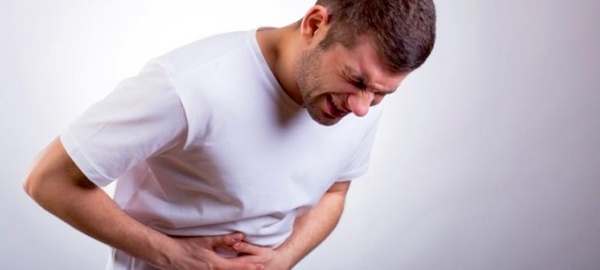
How does my stomach hurt?
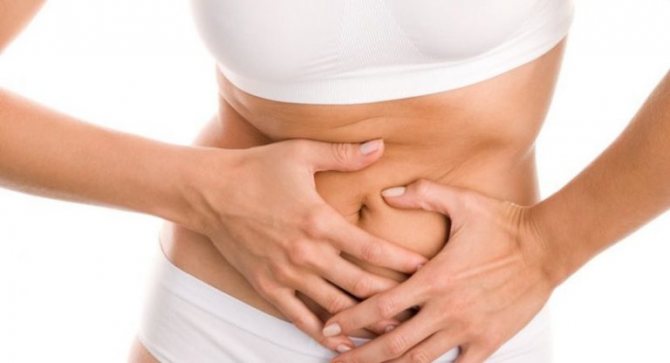
The nature of the pain may vary. In case of diseases of the stomach it is aching, in case of pathology of the pylorus it is often cramping. And when hydrochloric acid refluxes into the esophagus, it causes a burning sensation. Nagging pain may be a sign of gastroptosis.
Irradiation plays a certain role in recognizing pathology. When the upper section is affected, pain spreads to the heart, scapula, and thoracic spine. If the posterior wall is affected, it spreads to the left hypochondrium. In case of pathology of the lower sections - irradiation to the right hypochondrium.
The intensity of pain is an individual concept. As is correct, with pathology of the gastrointestinal tract, in most cases the pain is not intense. A sharp, dagger-like appearance appears with complications associated with gastric bleeding - perforation of an ulcer, penetration of a tumor. The intensity also depends on the characteristics of the nervous system of people. Young patients experience more acute sensations than older patients. This is due to the activity of their nervous system. Also, increased sensitivity can occur with mental illness, emotional personality type.
Diseases can have a clear periodicity. So, with an ulcer, exacerbations can last from several weeks to several months, followed by remission. Exacerbations are observed in the autumn-spring period. Remission - in summer.
Different reactions of pain to taking medications: for gastritis, dietary nutrition, warm drinks, taking antacids (Phosphalugel, Almagel-neo) and drugs that reduce gastric secretion (Omeprazole, Ranitidine) relieve pain.
Other symptoms accompanying stomach diseases:
- dyspeptic: nausea, belching, feeling of heaviness, fullness in the epigastric region
- dysmotility of the upper gastrointestinal tract: vomiting, heartburn;
- general: headache, weakness, dizziness.
First aid for acute pain
To alleviate the condition of a patient who has acute pain in the stomach, first aid is necessary.
In cases where such an alarming symptom occurs, you should urgently consult a doctor. However, before his arrival, you can try to somewhat reduce the intensity of negative feelings.
It is very important to immediately clarify in case of acute stomach pain what should be taken. Under no circumstances should you take any pills without a doctor’s prescription, apply warm compresses, or try to cleanse your stomach yourself.
All medications must be prescribed by a specialist.
Samples of vomit and stool should be kept and presented to the doctor and then taken to the laboratory.
The use of therapeutic fasting or a special diet is mandatory. It will reduce irritation of the receptors in the internal cavity of the stomach and stabilize the synthesis of hydrochloric acid.
Small quantities are allowed:
- jelly;
- infusions from medicinal plants;
- semi-liquid cereals;
- steamed chopped vegetables;
- lean meat;
- apples;
- fish.
In case of acute stomach pain, it is necessary to completely exclude fried foods, fatty foods, sweets, pickles, sour fruits and berries, and juices from concentrates from the diet. They affect the mucous membrane and greatly irritate it, causing nausea, flatulence and belching, as well as increasing general discomfort.
In case of chronic peptic ulcer or gastritis, if there are available recommendations from doctors, it is allowed to use home recipes. They are based on the use of natural factors and have a minimum of side effects.
Muscle pain and injury
Overuse of muscles, a sedentary lifestyle, and injuries from falls can cause pain in the abdominal or back muscles. These injuries can cause pain that comes and goes.
Pain that occurs only in certain positions, during lifting or after exercise, may be a sign of muscle injury.
Muscle injury is a medical emergency. Most people can treat muscle injuries at home with rest, hot and cold compresses, and gentle massage.
If home treatment does not help or the pain is very severe, it is best to consult a doctor.
Folk remedies
In some cases, folk remedies are effective and should be used in combination with the main treatment. To relieve pain, you can try the following recipes:
- gooseberry infusion: take 1 tbsp. l. berries, pour 250 ml of water, put on fire and boil for 20 minutes. (take 50 ml orally every 3 hours);
- blueberry infusion: take 2 tbsp. l. berries, pour 300 ml of boiling water, leave for an hour (take orally instead of tea);
- infusion of currant leaves: take 2 tbsp. l. dried leaves, pour 200 ml of boiling water, leave for 30 minutes (take orally instead of tea);
- chamomile tea: take 1 tbsp. l. dried flowers, pour 250 ml of boiling water, leave for 40 minutes (use internally instead of tea).
In any case, you should rely on self-medication. Any disease that occurs with pain requires qualified action. Therefore, if alarming symptoms occur, you should consult a doctor.
Noticed a mistake? Select it and press Ctrl+Enter to let us know.
September 18, 2020, 9:06 am 0 12,988
Nagging pain in the epigastric area is sufficient grounds for consultation with a specialist. Unpleasant sensations are often associated with poisoning, serious illnesses, pathological or inflammatory reactions. The condition requires diagnosis of the causes and immediate treatment.
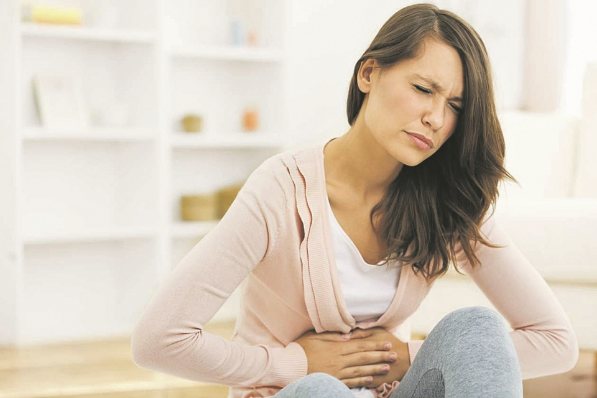
Examination and treatment
If you experience nagging pain in the stomach, you should consult a therapist or gastroenterologist. The doctor will order you to undergo a certain list of general tests:
- laboratory tests of blood, urine, feces;
- blood biochemistry;
- determination of sugar level.
To make an accurate diagnosis, you will need to undergo fibrogastroduodenoscopy - an endoscopic method of examining the stomach from the inside. A special endoscope is inserted into the cavity. Using optics, the degree of inflammation, damage to the mucous membrane by erosions or ulcers is assessed.
If your stomach hurts, symptomatic treatment is prescribed. For this purpose, individually selected antispasmodics and painkillers are used. But the basis of pain relief is the elimination of the underlying disease. Depending on the severity of the underlying pathology, treatment will be carried out at home or in a hospital. An important condition for effective therapy is diet.
Ulcers as a cause of stomach pain
An ulcer is an inflammation of the mucous membrane of the stomach or intestines. Causes of ulcers include:
- long-term use of nonsteroidal anti-inflammatory drugs (NSAIDs), such as ibuprofen
- Helicobacter pylori infection
- non-cancerous stomach tumors
People with ulcers usually experience a sharp, burning sensation in the stomach. The burning sensation may spread up the chest and into the mouth or throat, causing heartburn or indigestion.
Symptoms usually worsen after acidic foods. The pain may come and go. A person may not notice any symptoms for several months and then find that the symptoms steadily worsen.
Antacids may help. Your doctor may also prescribe medications to treat pain.
When to see a doctor
Many causes of severe stomach pain, such as ovulation pain, do not require treatment. Others, such as food sensitivities, are not medical emergencies. Seek medical help if you have severe pain or stomach pain that gets worse over time.
Symptoms that may require emergency medical attention include:
- severe abdominal pain during pregnancy
- symptoms of premature birth
- severe pain in the upper right abdomen
- bloody diarrhea
- vomiting and symptoms of dehydration such as sunken eyes or dry lips
- sudden, severe, unexplained abdominal pain
Brief information
Sharp, intermittent abdominal pain is difficult to ignore, especially when it occurs with other symptoms.
While many causes of stomach pain are not harmful, others can lead to serious complications. If a person is unsure about the origin of stomach pain, it is best to talk to a doctor. It is almost impossible to diagnose the cause of stomach pain based on symptoms alone. The doctor may take an X-ray, ask about the person's medical history, or examine the stomach to get the correct diagnosis.
Folk remedies
For nagging pain in the stomach, some folk recipes can help:
- St. John's wort tincture. You will need to leave for 2 days, 4 tbsp. l. plants in 500 ml Decoctions of medicinal herbs will relieve nagging abdominal pain
alcohol You should drink the product 25-30 drops diluted in 30 ml of water up to 3 times a day.
- Fresh cucumber juice. The product is useful in relieving throbbing pain in the stomach. It is enough to drink 3 tbsp. l. in a day. You can sweeten the juice with sugar or honey.
- Infusion of meadowsweet inflorescences. The remedy helps with acute stomach pain. Prepare a product from 1.5 tsp. dried inflorescences in 250 ml of boiling water. You can drink the infusion all day long instead of tea after keeping it in a thermos for 3 hours.
- Honeysuckle infusion. The product soothes the irritated gastrointestinal mucosa. Prepare a drink from 1 tsp. plants in 200 ml of boiling water. You need to drink the product after settling for 30 minutes, 1 tbsp. l. three times a day.
- Plantain leaves. You can chew them or drink the resulting juice (1 tablespoon three times a day). The product helps with back pain.
Diet for stomach pain
To eliminate stomach pain, you need to follow a diet. Buy food fresh and healthy. Do not eat processed foods, and cook yourself. Eat little by little and often up to 6 times a day. In case of vomiting and diarrhea at the initial stage, it is necessary to refuse food. Only on the second day are you allowed to eat a little lean broth and liquid pureed vegetables. And then, as your condition improves, diversify your diet.
For diseases of the gastrointestinal tract and not only, it is not recommended to eat hot or cold food, this has a bad effect on the functions of the internal organs of a person.
List of references: https://www.kp.ru/guide/bol-v-zheludke.html https://www.gmsclinic.ru/gms/press/articles/art-gastritis-golovenko https://euromed.ru /patients/simptomy/gastrojenterologija/boli-v-zheludke/ https://www.3crkp.by/information/useful-to-know/acute-pain-in-the-abdomen https://www.5gkb.by/uslugi/napravleniya/ khirurgiya/stati/ostrye-boli-v-zhivote/ https://www.wday.ru/krasota-zdorovie/sok/rezkie-boli-v-jeludke-prichinyi-i-sposobyi-ustraneniya/ www.zdorovieinfo.ru/ digestion/stati-digestion/14-prichin-boli-v-zheludke/ This material is exclusively subjective and is not a guide to action. Only a qualified specialist can determine an accurate diagnosis and prescribe treatment.
Last modified: 03/18/2020
Treatment with traditional methods
To relieve or alleviate the rolling pain, you should use traditional methods.
- One of the valuable remedies is medicinal chamomile. You need to brew chamomile tea and drink warm tea throughout the day;
- Add a tablespoon of gooseberries to a glass of water and boil for 15 minutes. We drink 50 g at intervals of 3 hours;
- Pass the dandelion leaves and stems through a meat grinder and add sugar to the mixture. Take this product one teaspoon in 100 g of water 3 times a day on an empty stomach.
How to quickly relieve stomach pain? Hydrogen peroxide can help with this. Dilute a drop of 3% solution in two tablespoons of water. We drink 3 times a day, increasing the dosage every day, bringing it to 10 drops. Drinking on an empty stomach is not recommended.
Examination and treatment
Only a doctor can identify the cause of pain in the stomach area, based on the results of laboratory and instrumental diagnostic measures. First of all, the painful area is palpated and the location and nature of the discomfort are determined.
To confirm the diagnosis, the following diagnostic measures are required:
- ultrasound examination, the results of which reveal pathologies of the mucous membranes of the stomach;
- magnetic resonance and computed tomography - studies that provide a more accurate picture of the condition of the organ than ultrasound;
- clinical and biochemical blood tests, urine tests to identify signs of an inflammatory process;
- stool analysis to detect signs of intestinal disease;
- probing the stomach and duodenum with examination of the contents to determine the level of acidity.
Most pathologies of the stomach that occur with pain symptoms are treated with conservative methods. The therapy is based on medications: antispasmodics, drugs from the group of sorbents, antibiotics that correct acidity.
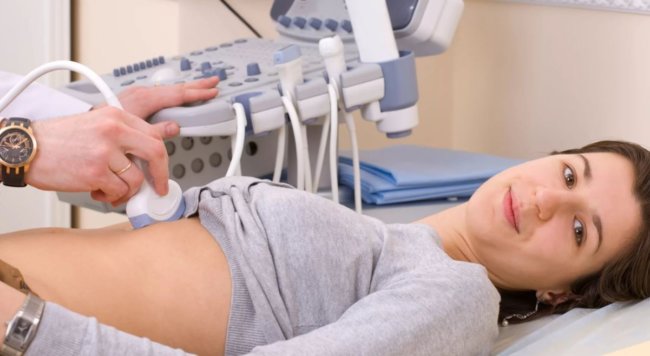
Surgical treatment is prescribed if the symptom is caused by the development of a benign neoplasm that does not grow deep into the walls of the stomach. Surgical intervention is also indicated for ulcers, which occur with an increased risk of organ perforation.





